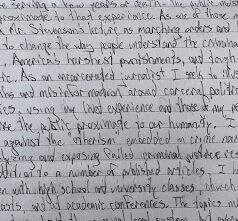Within a few months the classes on death row were eliminated. The rehabilitative ideal was purged. Central Prison became an increasingly violent place.
We received a new warden. His predecessor was supportive of programs and even allowed psychotherapeutic classes on death row. We had just finished our last performance of 12 Angry Men, not the sort of activity one expects a group of condemned prisoners to be engaged in, but North Carolina’s death row is a congregate confinement unit. We are not locked down in our cells, instead moving around the block much like general population prisoners. The new warden wanted none of it. Ordinarily, shaking hands with guards or prison officials is forbidden. It can mean solitary confinement for the prisoner and firing for staff. There are very few exceptions. There is also the taboo amongst prisoners that you don’t fraternize with staff. Our last warden who allowed programs on death row, who infused the prison with the rehabilitative ideal, was an exception. He shook everyone’s hand, looked them in the eye, and treated every person as an equal. A human. I walked over and stuck my hand out, the warden shook it, thanked me for participating in the play, and wished me luck on my appeals. Feeling the moment, I turned to his replacement with my hand out and said I hoped the classes were something he supported. He looked at my hand. Then at me. Then at the new unit manager, a guard who climbed the ranks to make management and who had said he wanted to see sentences carried out. “We’ll see about that,” said the new warden. And so we did.
Within a few months the classes on death row were eliminated. The rehabilitative ideal was purged. Central Prison became an increasingly violent place. We look back on that time when we had classes and performed in plays with a sense of nostalgia. For a while, at least one warden remembered we are human.






